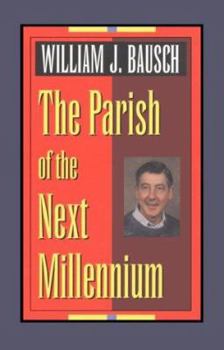The Parish of the Next Millennium
As the new millennium approaches, here is a great resource for Catholics to discern the current movements in their parish and to begin planning the kind of spiritual and operational posture their... This description may be from another edition of this product.
Format:Paperback
Language:English
ISBN:0896227197
ISBN13:9780896227194
Release Date:April 1997
Publisher:Twenty-Third Publications
Length:288 Pages
Weight:0.82 lbs.
Dimensions:0.6" x 5.5" x 8.4"
Customer Reviews
1 rating
Pressures For New Models of Doing Church
Published by Thriftbooks.com User , 16 years ago
Written in 1997 in anticipation of church life in post-2000AD, this book -- written from a Roman Catholic perspective -- honestly faces some of the struggles that will challenge the church's existence in the future. I think the author is way too optimistic, as I don't think he reckons with the inflexibility of ecclesiastical hierarchies. Within the ranks of Catholicism, Bausch notes that commitment is down, giving is deplorable, the ranks of the priesthood are declining, and he asks, "How long can we call ourselves a eucharistic church when 70% of our people do not celebrate it?" (p.50) "Going to church" has become irrelevant for much of Western culture. The monstrous and expensive buildings have become an unbelievable burden. "All over Europe churches are becoming shops, restuarants, and mosques. As attendance declines and numbers dwindle, what do you do with the large cavernous churches, chapels, and monasteries that require small fortunes to keep up?" (p.62). Bausch sees the following significant changes for parish life in the 21st century (I've put some of these marks in my own words): **More "lay" involvement **More emphasis on the giftedness of all than the "ordination" of the few **More emphasis on human relationships than on maintenance of the institution **More emphasis on koinonia fellowship that top-down hierarchy **More emphasis on the practice of wisdom than the mere acquisition of knowledge **More emphasis on spiritual formation and less on implementing programs **More emphasis on creative worship and less on repetitive ritual acts **More servant leadership **More emphasis on weakness instead of power **More intergenerational education and not just a focus on education for children **More collegiality and less top-down management. "There is no doubt in my mind thant any kind of authoritarianism will be out (or at least minimalized) in the next millennium." (p.249) **More participation and involvement of women These are noble goals, and if taken seriously would result in noticeable renewal. However, there remains an unresolved and insurmountable bottleneck in Bausch's wonderful proposals: the Roman Catholic hierarchy, resting on the clergy/laity distinction, is a non-negotiable. In Catholicism (and much of Protestantism) you simply can't do church "without benefit of clergy" (p.39). "Everyone knows that ultimately certain people, by virtue of their superior office or position, will alone and unilaterally have to make a decision. That's what hierarchy is all about" (p.114). The tragic reality is that the gifts of all must be sacrificed in order to maintain the institution. We would do well to heed another voice in Catholicism who was, unfortunately, rejected by the powers at the top. Herbert Haag in "Upstairs, Downstairs: Did Jesus Want a Two-Class Church?" (1997) advocated the full priesthood of all believers, and suggested that any male or female could be commissioned to "conduct the eucharist" (p.110). Jon Zens, F





